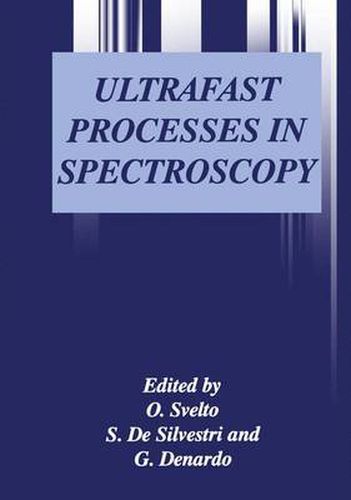Readings Newsletter
Become a Readings Member to make your shopping experience even easier.
Sign in or sign up for free!
You’re not far away from qualifying for FREE standard shipping within Australia
You’ve qualified for FREE standard shipping within Australia
The cart is loading…






This title is printed to order. This book may have been self-published. If so, we cannot guarantee the quality of the content. In the main most books will have gone through the editing process however some may not. We therefore suggest that you be aware of this before ordering this book. If in doubt check either the author or publisher’s details as we are unable to accept any returns unless they are faulty. Please contact us if you have any questions.
This volume is a collection of papers presented at the Ninth International Symposium on Ultrafast Processes in Spectroscopy (UPS ‘95) held at the International Centre for Theo retical Physics (ICTP), Trieste (Italy), October 30 -November 3, 1995. These meetings have become recognized as the major forum in Europe for discussion of new work in this rapidly moving field. The UPS'95 Conference in Trieste brought together a multidisciplinary group of researchers sharing common interests in the generation of ultrashort optical pulses and their application to studies of ultrafast phenomena in physics, chemistry, material science, electronics, and biology. It was attended by approximately 250 participants from 20 countries and the five-day program comprises more than 200 papers. The progress of both technology and applications in the field of ultrafast processes during these last years is truly remarkable. The advent of all solid state femtosecond lasers and the extension of laser wavelengths by frequency conversion techniques provide a large variety of high-performance light sources for ultrashort pulses. With these sources ultrafast phenomena in physical, chemical and biological systems and in electronic de vi(:es are now studied extensively. Ultrafast technology is becoming one of the basic and common tools presently entering a wide variety of scientific fields not only for basic re search but also for promoting new applications in various areas. We feel that these pro ceedings vividly reflect the present status of the field.
$9.00 standard shipping within Australia
FREE standard shipping within Australia for orders over $100.00
Express & International shipping calculated at checkout
This title is printed to order. This book may have been self-published. If so, we cannot guarantee the quality of the content. In the main most books will have gone through the editing process however some may not. We therefore suggest that you be aware of this before ordering this book. If in doubt check either the author or publisher’s details as we are unable to accept any returns unless they are faulty. Please contact us if you have any questions.
This volume is a collection of papers presented at the Ninth International Symposium on Ultrafast Processes in Spectroscopy (UPS ‘95) held at the International Centre for Theo retical Physics (ICTP), Trieste (Italy), October 30 -November 3, 1995. These meetings have become recognized as the major forum in Europe for discussion of new work in this rapidly moving field. The UPS'95 Conference in Trieste brought together a multidisciplinary group of researchers sharing common interests in the generation of ultrashort optical pulses and their application to studies of ultrafast phenomena in physics, chemistry, material science, electronics, and biology. It was attended by approximately 250 participants from 20 countries and the five-day program comprises more than 200 papers. The progress of both technology and applications in the field of ultrafast processes during these last years is truly remarkable. The advent of all solid state femtosecond lasers and the extension of laser wavelengths by frequency conversion techniques provide a large variety of high-performance light sources for ultrashort pulses. With these sources ultrafast phenomena in physical, chemical and biological systems and in electronic de vi(:es are now studied extensively. Ultrafast technology is becoming one of the basic and common tools presently entering a wide variety of scientific fields not only for basic re search but also for promoting new applications in various areas. We feel that these pro ceedings vividly reflect the present status of the field.